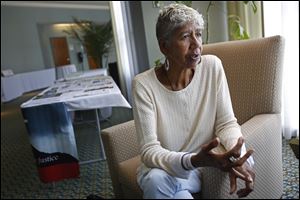
'Restorative Justice' raises dialogue on equality
6/22/2013
Ericka Huggins, professor of sociology at Laney and Berkeley City College and professor of women's studies at California State University, East Bay.
This year’s National Conference on Restorative Justice opened dialogue on how injustices in race, ethnicity and class can be repaired by taking a community, holistic approach.
During the three-day conference titled "Keeping it Real: Race & Restorative Justice," faith leaders, educators, judges, politicians and policy makers from 31 states and three countries came to the University Toledo campus. There, they explored race and the use of restorative justice principles and practices. The event was hosted by Lourdes University and UT.
One speaker Ericka Huggins, a professor in Sociology at Laney and Berkeley City College in California, urged attendees to take a different perspective on how the justice system treats minorities.
“I want to stop the cradle to prison pipeline,” Ms. Huggins said. She used the public school system as an example of American society upholds prejudice, and faults the overarching structure of public organizations rather than the individual.
“We have an apartheid education system," she said pointing to the recent incident in San Antonio where an 8-year-old boy was ducttaped to his chair during class by his teacher for being “rowdy.”
She said that it was one example of how structural racism allows people to be treated differently based on their skin color. She said that the teachers response of duct-taping a child to a chair, is comparable to the punitive measures of prison.
“It is not the fault of the teacher... I don’t fault anyone, but now that we know it’s broken let’s try to repair it,” she said.
The principles of restorative justice focus on repair and forgiveness, attained through open and honest dialogue, even if the topic - such as race - makes one feel uncomfortable. But compassion and non-judgment is key, she said.
“We need to release the things that have been in the backpack of our life,” she said.
Several attendees found the conference and the discussions to be deep and emotional.
Tiffany Paris, conference photographer and daughter of the conference Co-chair Gina Paris, said that many felt the need to debrief after some sessions that caused people to look within, and stirred up some negative past incidents. She said Ms. Huggins' presentation softened her heart.
“Ms. Huggins opened my mind and heart because you don’t know what issues other people are dealing with or have dealt with in the past,” said Ms. Paris of Toledo.
Her brother-in-law Dominique Poellnitz, owner of finditintoledo.com and also an employee of Toledo Correctional Institution, said he found truth to Ms. Huggins' observation of the public school system and judicial system, and said he saw instances where people of the same demographic might be arrested for the same crime, but it is the sentencing, or type of punishment that differs when it comes to race.
Both said that the problems in the public school system that Ms. Huggins said she sees in California, is also present in Toledo.
“Race is a problem in the schools, and it is a distraction in learning when people focus on the color of your skin,” he said.
For more information about the conference or to view the week's presentations visit www.restorativejusticenow.org.
Contact Natalie Trusso Cafarello at: 419-206-0356 or ntrusso@theblade.com.